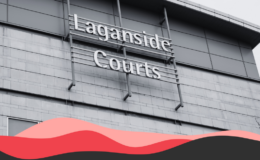- Sinn Féin withdrew from the Executive in January 2017, collapsing the institutions.
- However, the question of why devolution remained on the floor for three years is more complicated.
- Sinn Féin indicated a willingness to return to the Executive in early 2018, following negotiations. The DUP said they could not accept the terms being discussed and talks ended without a resolution.
- Stormont ultimately returned in 2020, following New Decade, New Approach.
On BBC NI show Sunday Politics on 1 October, News Letter editor Ben Lowry said:
“Sinn Fein brought down Stormont for three years, three years under no media pressure. Everyone was to blame, not Sinn Fein, until we got an Irish Language Act.”
Did Sinn Féin bring Stormont down for three years?
In one sense, yes – but it’s a bit more complicated than that.
Martin McGuinness resigned as deputy First Minister in January 2017, collapsing the Executive and preventing the devolved institutions from functioning properly.
In early 2018, big hitters from Sinn Féin and the DUP were involved in talks to restore the Executive. Sinn Féin said they wanted a return but the DUP said they could not accept the outcome of negotiations. At that point, it was arguably the DUP maintaining the collapse.
Of course, the DUP said the talks failed because they could not accept the terms being discussed so, from their point of view, Sinn Féin’s position remained the problem.
However, that line of thinking could be applied to the initial withdrawal itself. Sinn Féin’s stated reason for the resignation of Mr McGuinness was poor governance from DUP politicians in relation to the Renewable Heat Incentive, against the backdrop of the DUP’s alleged lack of respect for diversity. Some republicans also saw the removal of funding for the Líofa Gaeltacht Bursary Scheme by the DUP’s Paul Givan – then Minister for Communities – in December 2016 as a significant act that demonstrated a lack of respect between the two largest parties.
Sinn Féin instigated the collapse – even if they said this was in response to DUP shortcomings. The question of why Stormont remained on the floor, after the first year at least, is one of politics.
What about the Irish Language Act (ILA)? That became a key request for Sinn Féin in the negotiations to restore Stormont. It was also the major sticking point for the DUP.
However, ultimately the Assembly and Executive returned to full working order without a standalone act. Instead, the agreement – New Decade, New Approach – included commitments to amend existing legislation in support of the Irish language, Ulster Scots, and to establish an Office of Identity and Cultural Expression.
- Early 2017
Martin McGuinness resigned as deputy First Minister on 9th January 2017 as part of the fallout from the cost over run of the Renewable Heat Incentive scheme. In his resignation, he confirmed:
“In the available period Sinn Féin will not nominate to the position of deputy First Minister. We now need an election to allow the people to make their own judgement on these issues democratically at the ballot box.”
Under the rules of the government formation in Northern Ireland at that time, the resignation of the deputy First Minister automatically triggered the resignation of the First Minister, and then the rest of the Executive.
An election was held in March 2017 but the Stormont dysfunction continued.
- 2018: no-deal narratives
In early 2018, a period of intense negotiations to restore the devolved institutions failed. Issues around an Irish Language Act proved a key dividing line.
That February, Sinn Féin Northern Leader Michelle O’Neill indicated the party’s willingness to accept the draft proposals being negotiated with the DUP and the British and Irish governments. She said that they had “reached an accommodation with the leadership of the DUP.”
The DUP Leader, Arlene Foster said that her party would not accept a “one-sided deal”. Her party’s opposition centred on Sinn Féin’s desire for a standalone Irish Language Act:
“For almost four weeks, we have been engaged in intensive negotiations with Sinn Féin. We have attempted to find a stable and sustainable basis for restoring devolution. Those discussions have been unsuccessful. Despite our best efforts, serious and significant gaps remain between ourselves and Sinn Féin especially on the issue of the Irish language.”
Her position on walking away from the talks was supported by the then Deputy Leader of the DUP, Nigel Dodds:
“Arlene Foster was right to call time on the Talks. We want devolved government but not at any price. Sinn Féin collapsed the institutions thirteen months ago and arrived with a shopping list of demands before restoring the Executive. They wanted a one-sided deal which could not have commanded the support of unionists. That’s not acceptable.”
At the Sinn Féin Ard Fheis in June 2018, the Party President, Mary Lou McDonald said this about the party’s position on returning to Stormont:
“Let me be clear – a power-sharing executive and assembly in the North is still the right thing. And we are up for that. Michelle O’Neill stands ready to lead our team into Government.”
- 2019 – and still no breakthrough
When the DUP attempted to recall the Assembly to debate proposed changes to Abortion regulations in Northern Ireland emanating from Westminster, Sinn Féin’s Vice President, Michelle O’Neill blamed the DUP for not taking part in meaningful talks since early 2018, saying;
“[The] DUP have not engaged in meaningful negotiation since it walked away from a deal and talks in February 2018…
“Sinn Féin wants those institutions to be up and running on the basis of genuine power-sharing, of equality, rights and integrity and legislating for all. The next time we enter these institutions it should be to do real business with an Executive up and running and getting on with the serious work of government, on health, housing, education and the economy.”
The same position was outlined by Ms O’Neill in her Ard Fheis speech in November 2019. She told her party:
“I stand ready to form a credible executive. A New Assembly and a New kind of politics in the New year is what I am working towards.”
Ms O’Neill’s remarks were not a world away from the sentiments of DUP Leader Arlene Foster, who told her party conference in late 2019 that;
“I want to see the Assembly and Executive rejuvenated and re-energised. We are up for that. We know that Northern Ireland works best when we work together. And to get a deal to bring Stormont back, there will need to be an agreement that we all can support.”
2019 was essentially a battle of narratives between the two parties about who was keeping Stormont down and why.
- New Decade, New Approach
In January 2020, a political accommodation was announced. New Decade, New Approach led to the restoration of power-sharing government in Northern Ireland.
However, this included no commitment to a standalone ILA. Instead, it promised “the introduction and enactment of three Bills” to protect the Irish language, to protect the Ulster Scots language and tradition and to create a role of Ulster Scots Commissioner, and to establish an Office of Identity and Cultural Expression.




